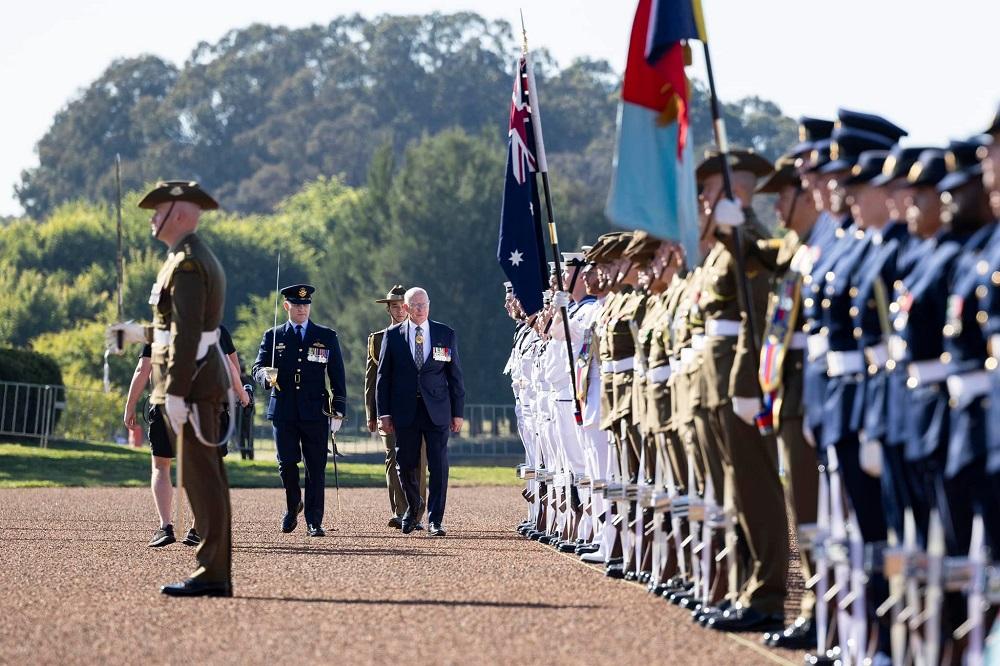
Do you recall the ‘Garage Girls’ from this year’s Australia Day honours? Joyce Grace, Coral Hinds and Ailsa Hale were recognised for their pioneering service during World War II with Central Bureau, a joint US–Australian signals intelligence organisation. The three Australians worked at the bureau’s Brisbane headquarters—in a garage annex that gave them their nickname—collecting and decoding Japanese signals and sending and receiving encrypted Allied communications. The ABC also highlighted their work in a documentary that aired last weekend, Breaking the code: cyber secrets exposed.
Grace, Hinds and Hale made an outstanding contribution to Australia that went unacknowledged publicly for decades. It was the institution of a specific honour for distinguished achievement in the field of intelligence—the Australian Intelligence Medal—that allowed for their recognition.
When the medal was introduced to the Australian honours system in 2020, it provided the first specific recognition by Australia of individuals’ intelligence work. Before that point, such recognition had occurred only through some other honour, such as a medal for military service, the Order of Australia or the Public Service Medal.
The Australian Intelligence Medal recognises members of the national intelligence community who have ‘given distinguished service that directly contributed to national intelligence priorities, requirements or capabilities’. It also entitles the recipient to use the postnominal ‘AIM’.
The medal itself features the federation star within which is a decagon representing Australia’s 10 intelligence agencies. The surrounding indented border represents the 24-hour-a-day nature of intelligence duties. A sprig of wattle provides a quintessentially Australian touch.
The Australian honours database lists 26 recipients of the AIM, more than half of whom are identified only by their first name and an initial. But from the available entries, one can discern the nature of their achievements, including leading contributions to analytical tradecraft, combating serious and organised crime, counterterrorism, mental health support, subject-matter and language expertise, financial intelligence and capability development. For those whose achievements have been withheld, we can only guess at the exemplary and courageous service they have rendered to Australia in the shadows.
As with other Australian honours, the AIM can also be awarded to a non-citizen in recognition of an exceptional contribution to Australia. In 2022, for instance, the medal was awarded to Shigeru Kitamura, a former director of cabinet intelligence and national security adviser to the Japanese government, for his contributions to the Japan–Australia intelligence relationship.
The AIM has helped fill an important gap in recognising service to Australia’s security and prosperity. But there is unfinished business.
The next step should be the creation of an Australian intelligence service medal, awarded to members of the national intelligence community on completion of a suitable term of service and subject to confirmation of honourable conduct. This would mirror comparable honours awarded to members of the military and police for terms of service, rather than deployments, such as the Australian Defence Medal for four years’ service or completion of an initial enlistment period (whichever is lesser), the Defence Long Service Medal for 15 years or more of service, and the National Police Service Medal for 15 years’ ‘efficient service’ in policing.
There would be challenges in creating such a medal. For good reason, service in parts of the intelligence community remains necessarily hidden, and enduring legal protections and responsibilities are accorded to those who work in those areas. But that hasn’t prevented the awarding of the AIM and it shouldn’t stand in the way of a service medal either.
There’s also the issue of appropriate historical recognition. How far back should eligibility for such a medal go? Again, this isn’t a dealbreaker. Awarding the AIM to Grace, Hinds and Hale created a precedent for retrospectivity. One approach could be to take the AIM’s establishment of 24 January 2020 as an effective census date for eligibility. That would enable former intelligence personnel to apply through the agency they served with (including for security reasons) or through the honours system.
An intelligence service medal would be an appropriate and ready way of recognising service when other forms of public recognition are simply not possible. It would also serve to illuminate the special nature of the Australian Intelligence Medal, distinguishing the unique achievements of AIM recipients beyond those of their colleagues awarded a service-based medal.
Importantly, it would also contribute to the suite of measures required for attracting and retaining the future intelligence workforce. As intelligence work becomes more valued, but also more demanding, this is especially important. On a related note, it is worth pointing out that many thousands of Australians made direct, often exacting contributions to the decades-long war on terror. If they served in uniform, or in very particular circumstances associated with military deployments overseas, then recognition has been provided through the honours system—but not otherwise. An intelligence service medal could help bridge this recognition gap.
Why does all this matter? After all, aren’t those who speak on behalf of the national intelligence community always banging on about not needing public recognition?
It matters because it’s one more component in a longer term transition to publicly acknowledging Australian intelligence’s role in promoting and protecting the national interest. This should be bolstered by more public commentary, including by ministers and agency heads, more pioneering works of history, and other efforts. Most importantly, the intelligence role is only going to get bigger in coming years with Australia’s growing need for sovereign insights into its dangerous strategic environment and for more options to effectively navigate that environment—especially options short of war and, in certain circumstances, as a means of avoiding war.